J
ust before eight in the morning on May 29, Lourdy Denis answered his phone and a woman informed him that his son had been shot in the head. She’d found Denis’ number scribbled on the back of the child’s notebook, and pleaded with him to come quickly. Denis raced to the Doctors Without Borders hospital in southwest Port-au-Prince, the Haitian capital, in a state of panic. How long would the boy hang on? And what happened to his younger brother? Lourdy-son and Paul were inseparable, and had left for school that morning together. On reaching the trauma ward, Denis found them side by side in comas. “One shot in the head,” he says, “the other in the heart.” The brothers passed away that day. Yet almost two weeks later, their father is ashamed to admit, their bodies are still in the morgue because he can’t afford to bury them.
Denis used to sell soft drinks from a shop on Rue Tiremasse in Bel-Air, a rundown neighborhood of tumbling cinder-block buildings known as a hotbed of political unrest. He says the business earned him enough to cover his sons’ school, until it was burned down. In November 2019, attackers from a neighboring gang torched his shop with Molotov cocktails and shot him in the foot and groin. It was the opening salvo of a brutal gang war that has left once-vibrant sections of the city abandoned and in ruin, the ground littered with bones and bullet casings. “This area was once a safe place,” says Denis, pulling on a cigarette. “Now, Barbecue is destroying everything.”
The man behind the carnage, according to Denis and Haitian investigators, is Jimmy “Barbecue” Cherizier, a former police officer turned shot-caller of the G9 Family and Allies, the most powerful gang federation in a country ruled by gangs. Since the July 2021 assassination of President Jovenel Moïse, a battle for supremacy between the G9 and an enemy alliance, the G-Pep, has plunged this Caribbean nation of 12 million into a catastrophic spiral of violence the United Nations says is on par with countries at war. Gangs now control nearly 90 percent of the capital, armed with American-made assault rifles. Homicides surged about 115 percent over the summer, and kidnappings are at an all-time high. Hospitals and schools have shut down, while most major relief agencies have pulled out altogether. “This is the worst I’ve ever seen it — a complete disintegration of the state,” says Robert Fatton, a Haitian American professor of politics at the University of Virginia. “And I don’t see an exit from the situation, frankly. I’m at a loss.”
Interim Prime Minister Ariel Henry has repeatedly called for a multinational force to break the gangs’ stranglehold, but to date, none has deployed. Utter desperation has sparked a wave of vigilantism that has seen suspected gang members hunted down by machete-wielding mobs and set on fire in the streets as police stand by. Gangs have responded by gunning down civilians. With no elected officials left in office and insecurity too great to hold an election, democracy is paralyzed. The only consensus is that the current march toward anarchy will grind on and civilians will bear the cost. “People here say their life is 24-hours renewable,” says Vélina Élysée Charlier, a political activist in Port-au-Prince. “Some would even tell you that they go by the minute, because you don’t know when a stray bullet is going to hit you.”
“I created the G9 to fight against this exploitative system — all for one, and one for all,” Barbecue says, adamant that the alliance is not a gang. “We’re an armed group with an ideology. We use our guns to put pressure on the state. This is a social fight.”
Jason Motlagh
In the vacuum of a broken state, the name Barbecue inspires both dread and praise — depending on where one happens to live. Cherizier and supporters from his Lower Delmas stronghold insist he’s a bulwark against predatory gangs that have long done the dirty work of politicians and elites. To denizens of Bel-Air and G-Pep-allied areas, though, he’s a bogeyman whose propensity for “spitting fire” keeps them awake at night. Human rights groups allege Cherizier is behind a litany of massacres dating back to 2017 that have killed and disappeared hundreds and moved the U.S. and U.N. to impose sanctions against him. The violence in Bel-Air last winter ended with at least 148 people murdered or missing and more than 60 homes burned to the ground, according to the National Human Rights Defense Network (RNDDH).
Relentless violence and poverty are driving an exodus of Haitians to seek asylum abroad. More than 105,000 Haitians were reported by U.S. customs at the southern border and at sea during the first nine months of 2023, almost double the previous year’s total. If hunger and insecurity keep deteriorating, the U.S. could experience “a seismic increase in irregular migration” from Haiti, warns Robert Muggah, co-founder of the Igarapé Institute, an independent think tank that focuses on security and development.
With a presidential election coming up next year in the U.S., rising migration pressures will test the resolve of candidates who have more in common than their postures suggest. In 2017, then-President Trump scrapped a policy that allowed some 60,000 at-risk Haitians to live and work in the U.S., later referring to Haiti and African nations as “shithole countries.” Although the U.S. remains the single largest donor of humanitarian aid to Haiti, President Biden has deported at least 20,000 Haitian asylum seekers since taking office, most of them under a despised Trump-era policy. (Biden did expand a parole program this year that allows Haitians to fly to the U.S. if they have a sponsor and meet other preconditions, but so far, 21 states have joined a lawsuit to block the program.)
As Haiti’s meltdown intensifies, the reluctance of Western countries to lead or meaningfully contribute to a stabilization mission could also have wider geopolitical repercussions. “[Their] aversion to putting boots on the ground sends a signal” that could “embolden more authoritarian governments and criminal networks” that are moving cocaine through the country, says Muggah. “On the other hand, it opens space for U.S. rivals such as China and Russia to shore up their influence in the Western Hemisphere.”
In the meantime, tens of thousands of Haitians continue to flee for the U.S. by boat and on flights to South America, after which they trek overland thousands of miles to the border. For those who remain, it’s a daily struggle to survive in a failed state.
Denis always liked Bel-Air for its lively, defiant atmosphere, and stayed on even after getting shot by Cherizier’s soldiers. But when his sons were killed, he relocated his family to a camp in the city center, occasionally returning to his old place to collect belongings. He unknots a trash bag filled with the boys’ personal effects: a backpack, frayed notebooks, and the clothes they wore on their last day. A stench of sour sweat and blood fills the baking-hot room.
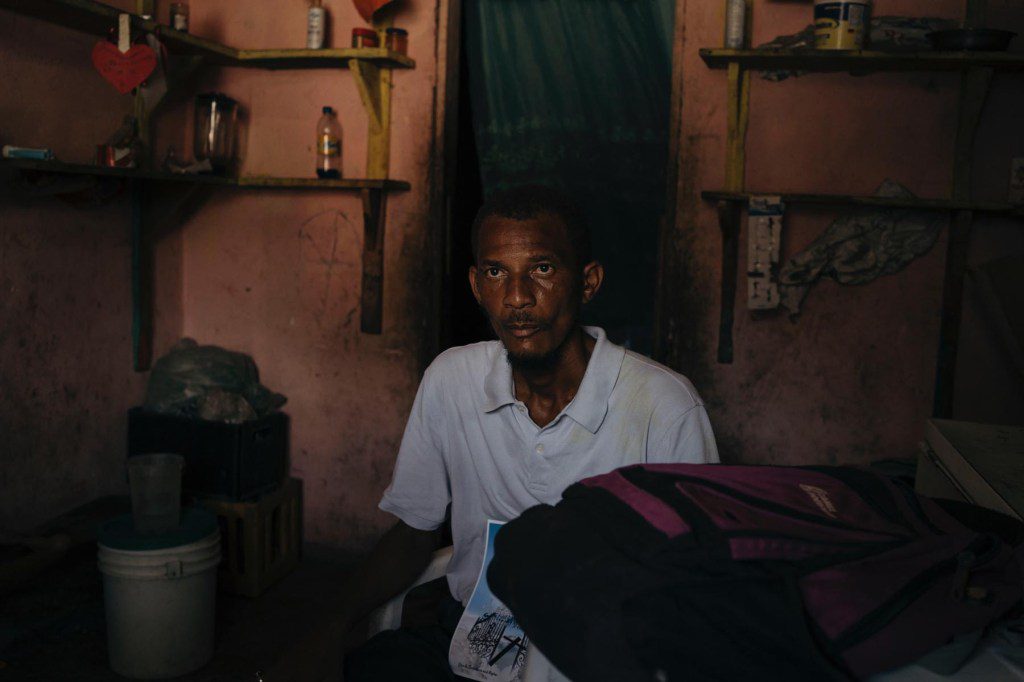
Lourdy Denis in his former home, abandoned after his sons were killed heading to school
Jason Motlagh
Lourdyson, 11, was a blue belt in karate and a promising soccer player. Paul, 13, wanted to become a journalist. “Anything I had was for them,” says Denis, “but I always told them not to count on me since people are dying in this country every day.” He finds 150 crumpled Gourdes in a pants pocket (about one U.S. dollar) — enough for one of the boys to buy lunch, not enough for bus fare that would have kept them off the street. “This was all I had to give.”
A burst of gunshots crackles across the rooftops. Dusk is falling, and Denis starts packing up to leave. “I feel like I’m a walking dead man,” he says. “There should be nobody in Haiti, because no one is spared. Barbecue is a vampire — a man who feeds on blood.”
ON A SUNDAY MORNING in Lower Delmas, the heart of G9 territory, Barbecue is sweating in the pulpit. Short and stern, wearing an all-black suit and gold chain with a Freemason pendant, he describes how his soldier Palalap was shot dead on April 26 by G-Pep-allied gangsters who, he claims, had broken a truce. “Remember that I am not God, and I cannot bring him back to life,” he says. The grieving mother starts to shriek and flail in the pew; Cherizier towels off his head. “I want everyone to know that in the fight to change this country many lives will be lost,” he goes on, urging people not to flee their homes but to defend the neighborhood against killers and kidnappers. “Know that I stand with you and will always be by your side.”
The G9 is part of a long pedigree of armed groups in Haiti that operate like the Mafia. Traditionally, being on their side can offer protection, money, food, a means of surviving. But Cherizier and other gang leaders have decoupled from their former politically connected patrons. “Now, [the gangs] have more autonomy, more power, and more weapons, so they are a threat to any constituted government,” says Fatton. “They have become a power unto themselves.” Presenting himself as a Robin Hood figure, Cherizier infuses his anti-elite rhetoric with a Black-power narrative that plays well on the street and reinforces his vision of becoming a player in Haiti’s government.
Cherizier steps outside to shake hands and kiss babies and pass out bank notes to children. G9 soldiers wearing “Rest in peace” T-shirts hoist the coffin and lead the procession to a new graveyard opened by Cherizier, trailed by a band playing “Auld Lang Syne.” At the burial site, a voodoo priest cleanses the gang with smoke. Cherizier pours some rum onto the casket before pistols are drawn for a three-shot salute. “Remember,” he tells his soldiers, “you are dust, and to dust you shall return.”
“Barbecue for president,” exclaims 65-year-old Jocelyne Alexis on the walk back to Cherizier’s place. A lifelong resident of Delmas, she says she was burned out of her home four years ago by rival gangs that are “spreading like a virus.” “I love him because he takes care of all of us; he pays for school, food, sickness care, and rent for us — literally everything. And he doesn’t use violence against us.” She shouts “Barbecue for president” again — throwing a glance his way to be sure he registered the compliment.
Relative to other impoverished areas in the capital, the streets of Lower Delmas are clean and orderly. Sewage canals are choked with trash, but the pavement is free of it; walls are whitewashed and feature graffiti art commissioned by Cherizier. A recurring motif is “Barbevara” — his hard face superimposed on the iconic Che Guevara portrait (Cherizier also has an iPhone case customized with this likeness).
Cherizier served 14 years as a police officer. A badge is tattooed on his wrist — along with his favorite machine gun — and he credits the discipline learned on the job with keeping him alive and his neighborhood intact. He has an organized hierarchy of captains and soldiers, and keeps meticulous inventory of his arsenal. To this day, Cherizier prefers to sleep on the pavement in front of his house so that “everyone can rest easy inside their own homes.”
At the periphery of Delmas 6, his home base, he does a spot-check of his frontline defenses, calling out to soldiers on watch. Skinny youngsters in jean shorts and flip-flops appear from decrepit walls and rooftops strapped with AR-15s, M4s, and M-16s. Cherizier won’t say where he gets his money or guns, only that he’s got a lot of them. “Every day more and more weapons are flooding into the country,” he says.
A U.N. report authored by Muggah indicts the U.S. as the fountainhead of Haiti’s gun crisis. Criminal networks and members of the Haitian diaspora typically procure weapons through straw-man purchases in states with lax gun laws, then transport them via Florida to Haiti. With 1,100 miles of coastline to police, crooked customs agents, and a toothless judiciary, anything can be had for a price.
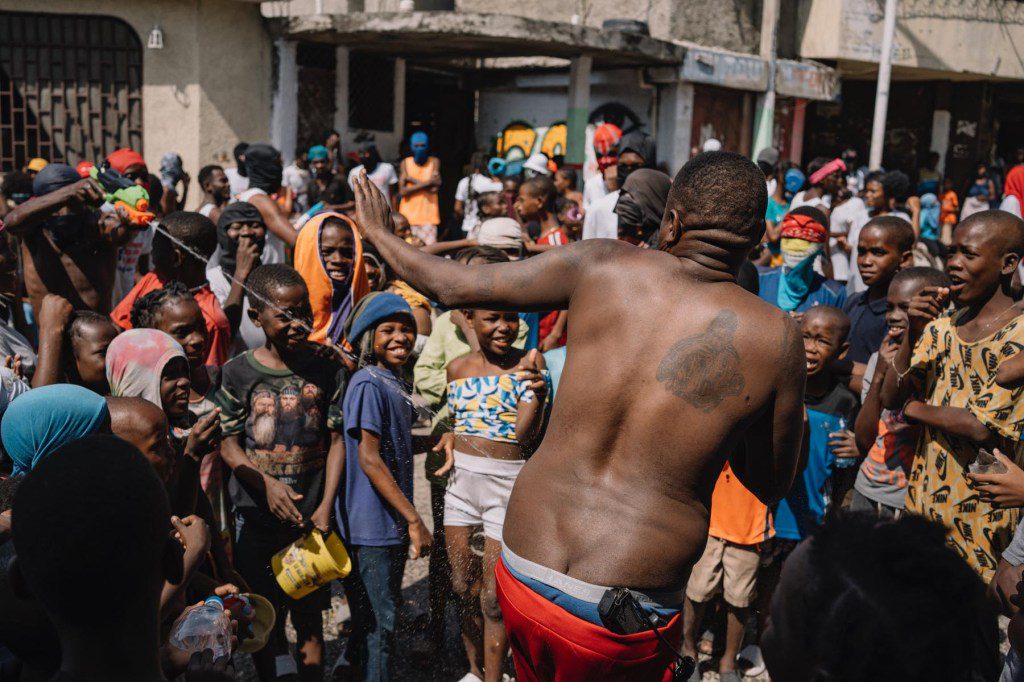
A former cop, Cherizier rules his territory like a feudal lord. “If I were a killer and a kidnapper, these people would hate me,” Barbecue says. “How could I kill my own class? These are my people.”
Jason Motlagh
I follow Cherizier into a partially built structure that was intended to be a vocational school. He says G-Pep-allied gangs used it to hold kidnapped people, “so we took it back.” This is where his soldier Palalap was shot in the chest standing guard the week before.
But Cherizier notices one of the windows has not been bricked up — a security lapse that tips his foul mood from the funeral. He snatches a rifle from one of the soldiers, jams the barrel into a firing hole, and discharges a full clip’s worth of rounds at G-Pep enemy positions less than 50 yards away.
CHERIZIER GREW UP POOR in Lower Delmas, one of eight children; his father died when he was a boy. Contrary to the popular belief that it comes from his penchant for setting people on fire, he was nicknamed “Barbecue” because his mother sold grilled chicken. After studying computer science in college, he joined the police in 2004, an inflection point for a country in perpetual crisis. Haiti’s first democratically elected leader, Jean-Bertrand Aristide, was facing a popular backlash, and gangs known as chimères (ghouls) linked to his Lavalas Party were sowing terror in restive slum areas. As armed insurgents closed in on the capital, Aristide fled into exile and a U.S.-led multinational force intervened. But the gangs would multiply with support from political paymasters who wielded them as tools of oppression.
Haiti remains the poorest country in the Western Hemisphere, plagued by natural disasters and man-made dysfunction. Following the 2010 earthquake that killed more than 200,000 people and brought the country to its knees, more than $13 billion in foreign aid money poured in. To bypass official graft, all but one percent was spent through nongovernmental organizations, leaving an “increasingly smaller eye for a rapacious elite” who will do anything to gain power and stay there in a “war of all against all,” says Fatton. Between 2008 and 2016, nearly $2 billion was allegedly embezzled from a Venezuela-sponsored oil-loan program. Two prime ministers and a former president are among the dozens of elected and appointed government officials who have been implicated in corruption, money-laundering, arms-smuggling, and drug-trafficking schemes. The country remains a trans-shipment point for Colombian cocaine bound for the U.S. Soaring costs for basic necessities such as fuel and food further enriched the oligarchs who controlled the economy. As more people took to the streets to protest, the gangs’ utility for intimidation only grew.
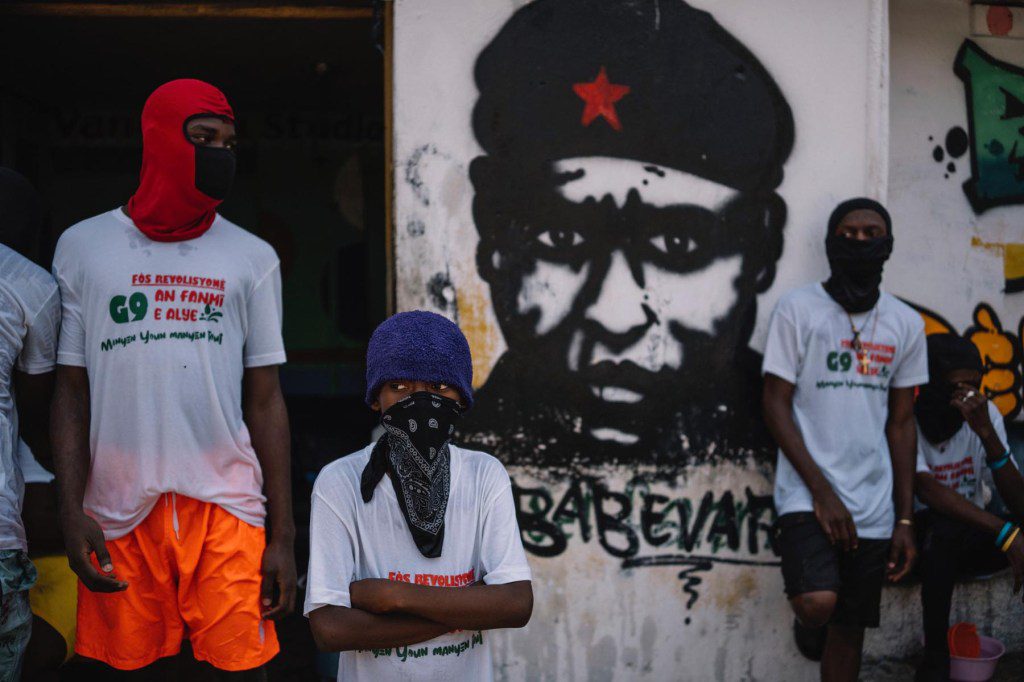
Young G9 soldiers.
Jason Motlagh
When Moïse took office in 2017, Cherizier was serving in a specialized force deployed to suppress riots. That year, he was allegedly involved in the extra-judicial killing of nine civilians. Fired from the police and with a warrant out for his arrest, he was accused of facilitating another massacre with two Moïse administration officials in November 2018 against protesters in the slum of La Saline — the deadliest in more than a decade. According to a report by Harvard Law School’s International Human Rights Clinic, 71 people were killed, 11 raped, and some 150 homes destroyed. In the days after, videos circulated on social media of pigs feeding on burned and dismembered bodies.
Cherizier had been implicated in other massacres when he formed the G9 in mid-2020 on a pledge to restore peace across the capital. Instead, critics say, the group expanded its territorial control while giving President Moïse, Cherizier’s alleged sponsor, a unified weapon to crush opposition. For months Moïse had been ruling by decree, and protests demanding his resignation over alleged graft, gas shortages, and rising violence were at a fever pitch. Donning military fatigues and flanked by dozens of masked gunmen, Cherizier held a press conference calling for an uprising, later flexing that he was “ready for war.”
The assassination of Moïse in his bedroom in July 2021 laid bare the weakness of the state — and G9 has filled the power vacuum. That October, gangs opened fire on a government convoy and shut down an official ceremony, compelling Prime Minister Henry to flee; Cherizier, dressed in a white suit, took over the ceremony. On two occasions over the next year, G9 enforced a blockade of Terminal Varreux, Haiti’s largest oil terminal, sparking fuel crises that choked the economy and forced hospitals and schools to shut down during a cholera outbreak. “Frankenstein long ago lost control of the monster, and Barbecue is now more powerful in parts of Port-au-Prince than the elites who spawned him,” says Jeremy McDermott, co-director of InSight Crime, a think tank that studies organized crime in Latin America and the Caribbean. “The lack of any legitimate government and the impotence of Ariel Henry strengthens the gangs’ claims to represent the communities they dominate.”
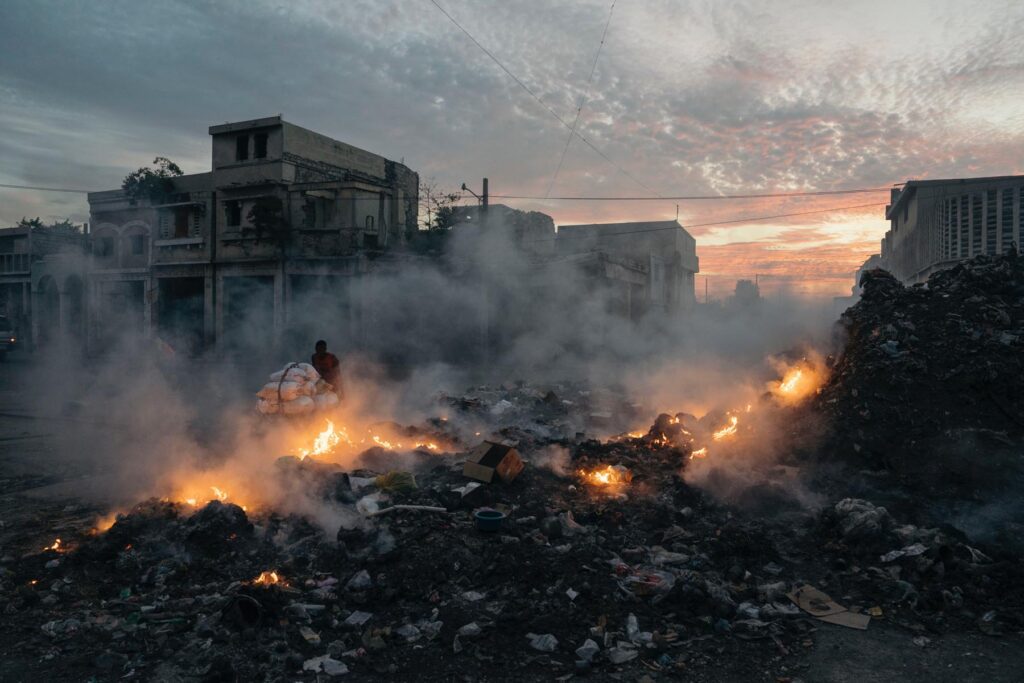
A porter passes a burning trash pile on Boulevard Dessalines, Port-au- Prince.
Jason Motlagh
Cherizier denies any involvement in the massacres, or that he was ever on Moïse’s payroll, dismissing “95 percent” of the allegations against him as lies. He insists they are part of a coordinated effort by Haiti’s elite, the political class, and human rights groups to defame him for daring to challenge the established order. “For 50 years, the country has been swimming in corruption. The oligarchs hoard the wealth of the country and conspire with politicians to protect their interests at any cost,” he says. “The more instability there is, the wealthier they become.”
Moïse was initially “a puppet” used by the system, Cherizier says. But as a former banana producer from the countryside, Moïse came to realize the biggest obstacles to reforming the state were the oligarchs. “He started to fight against them — that is why he was assassinated,” he says. “I truly believe he was willing to lead the country in the right direction.
“I created the G9 to fight against this exploitative system — all for one, and one for all,” he goes on, adamant that the alliance is not a gang. “We’re an armed group with an ideology, which is to live in a country where the state is working for the benefit of the majority, where the wealth of the country is shared with the poor. We use our guns to put pressure on the state. This is a social fight.”
Late one afternoon, Cherizier organizes an impromptu motorcade of a dozen soldiers on motorbikes to show me around La Saline, the scene of the 2018 massacre. People avert their gaze as we streak past. In the main market, I see G9 gangsters collecting “protection” money from produce sellers. Shipping containers block access at one end of the main road, and walls are splashed with freshly painted portraits of Nelson Mandela and Martin Luther King Jr. Inside the cramped warrens of clapboard and rusted metal, the heat is suffocating. Charred patches indicate where some of the massacre took place.
With an armed entourage in tow, Cherizier grandstands. “If I were a killer and a kidnapper, these people would hate me — do you hate me?” he asks aloud to no one in particular. “How could I kill my own class? These are my people, just look at the sad way they are living.
“What do you need, my dear,” he stoops to ask a frail woman. “The difference between the G9 and the other armed groups,” he continues, “is that we never kidnap, rape, or slaughter in our communities. We don’t need new territory. Our goal is not money, but a new Haiti.”
And yet the massacre allegations against Cherizier and the G9 keep piling up. When I mention the latest attacks, he turns cold and unapologetic. “Every action deserves a response. The [G-Pep] gangs from Bel-Air and their allies launched an attack on us, and we struck back — and we did so instantly,” he says. “We don’t know how many dead and wounded there are on their side. All we know is that we responded.”
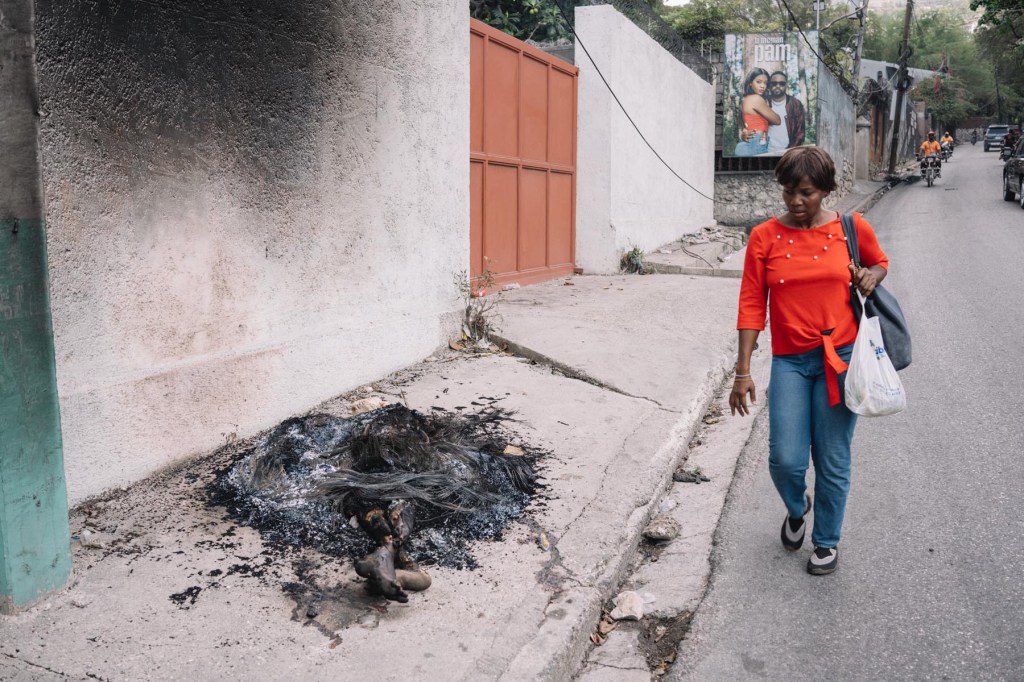
A woman avoids the smoldering remains of an alleged gang member who was lynched by Bwa Kale vigilantes.
Jason Motlagh
A FEW DOORS DOWN from Lourdy Denis’ home on Rue Tiremasse, I’m led down a narrow alleyway to a charnel house. Rows of dwellings are gutted and fire-scorched, personal effects scattered on the ground: melted plastic sandals, hair extensions, a teddy bear — along with ribs and vertebrae of inhabitants burned alive. “There were some skulls here before, but the dogs must have run away with them,” says Marc-Andre Alexandre, the self-appointed spokesman of Bel-Air.
On the night of March 3, amid a weeklong spree of attacks, Alexandre says Barbecue’s soldiers burst through the alley and laid waste to the area, with reinforcement from police officers. “They come slaughter the population on the pretext that guys from Bel-Air are kidnapping people,” he says. “There were no hostages here, only victims.” At least 20 people were burned in their homes, and some 50 more were taken away, according to the rights group RNDDH.
I find 17-year-old Taina Jean washing clothes on a cracked concrete ledge. She says her mother, Betty, had gone out to run errands and was swept up in the attack. Jean called her mother’s phone again and again until a man picked up and said they’d already killed her: “Now, we’re going to burn her for you.”
Her father was killed in 2019, leaving her alone to take care of her grandmother. “As long as this country exists, nothing will change,” she says. “There are too many gangsters now — you cannot kill them all.”
Bel-Air itself has been a bastion of resistance since the Aristide days, when local gangs attacked U.N. peacekeepers stationed in the area. “People say we’re gangsters, but we’re not — we’re revolutionaries,” says Louna Georges, an activist whose husband was killed by G9 attackers in 2019. “They send people to kill us, then use the media to backbite us, so they destroy our lives in different ways. We have been living in pain for the last four years.”
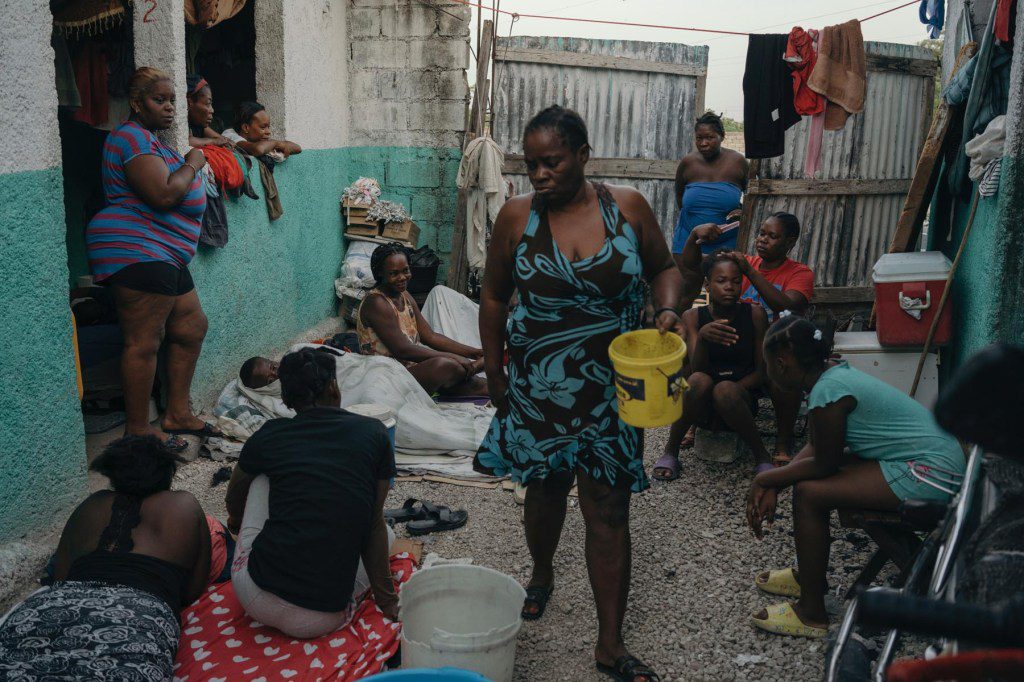
Internally displaced people at a makeshift camp in downtown Port-au-Prince
Jason Motlagh
The full truth is more complicated. A community leader who asked to remain anonymous explains that Bel-Air’s struggle to hold off G9 aggression created an opening for an ex-convict named Kempes Sanon. After escaping from prison in 2021, Sanon set up shop in the neighborhood and allied with G-Pep. “Every time Barbecue attacks, Kempes is the one defending the people,” the leader says. “Without him, the G9 would have taken over long ago.” We spoke inside a car with tinted windows rolled up despite the heat. Nearby, a group of young men print “Happy Birthday Kempes” T-shirts, with a gunman logo. “He’s a hero to these guys,” the leader says.
Sanon is also a prolific kidnapper, and has turned Bel-Air into his base of operations. Now, every time the leader sees a vehicle with tinted windows pass by, he assumes it’s a kidnapping. “In Bel-Air today there are two kinds,” he says. “People who are suffering, and people who want money at any cost.”
Sanon’s campaign of terror has touched nearly everyone here. I meet women struck by gunfire while doing laundry and prepping dinner. The week before, a police inspector and his daughter were snatched by Sanon’s gang on one of the city’s busiest thoroughfares. As many as nine Haitian journalists have also been abducted since the start of the year. “They are grabbing people at will,” says RNDDH’s Rosy Auguste Ducena, noting that since 2018 not a single case has been successfully prosecuted. “No place in western Port-au-Prince is safe.”
At a fortified compound in the heights above the city, I had coffee with Pierre Buteau, a bespectacled 74-year-old historian and former education minister who spent 10 days in G-Pep captivity. His brother was kidnapped in 2006, “back when it was more political,” he says. “Today it’s economic, a trade.” One morning in January, Buteau was opening his doors and windows, a nervous habit he’s maintained since the earthquake, when four gunmen burst in with pistols drawn. They seized his watches, TV, and car, and drove him to Sanon’s zone of control. From conversations with his captors, Buteau says, he learned Johnson Alexandre, alias “Izo,” of the widely feared 5 Segond gang, provided logistics support. “It was a collaboration,” he says, “and I was at the center of it.”
The ransom demand was $1 million. (Buteau refuses to disclose the exact amount paid, only that it was in the tens of thousands.) He now teaches all of his university classes on Zoom. He seldom ventures outside of his home and is regularly jolted awake by traumatic flashbacks. Still, he says, he was never physically harmed by his captors and can sympathize with their plight. All of them were born into poverty and infected by a “social disease,” says the professor. “They carry weapons to solve their misery. This is how they can be equal to others.
“We have an elite with a highly acquisitive instinct for wealth,” he adds. “People are asking questions, and the government is unable to answer them. When society is on the verge of collapse, and another society fails to emerge, this gives rise to monsters.”
WITH NO AUTHORITIES to count on, fed-up Haitians are taking matters into their own hands. This spring, police confiscated weapons from more than a dozen purported gang members on a public bus. A mob quickly descended and seized the men, beating them and setting them ablaze in the street with gasoline-soaked tires. The lynching marked the start of Bwa Kale, which literally translates to “peeled wood” (or, in crude slang, “erection”) in Haitian Creole, an unprecedented anti-gang uprising that has seen large groups of people with machetes and rocks roaming neighborhoods across the capital looking for criminals.
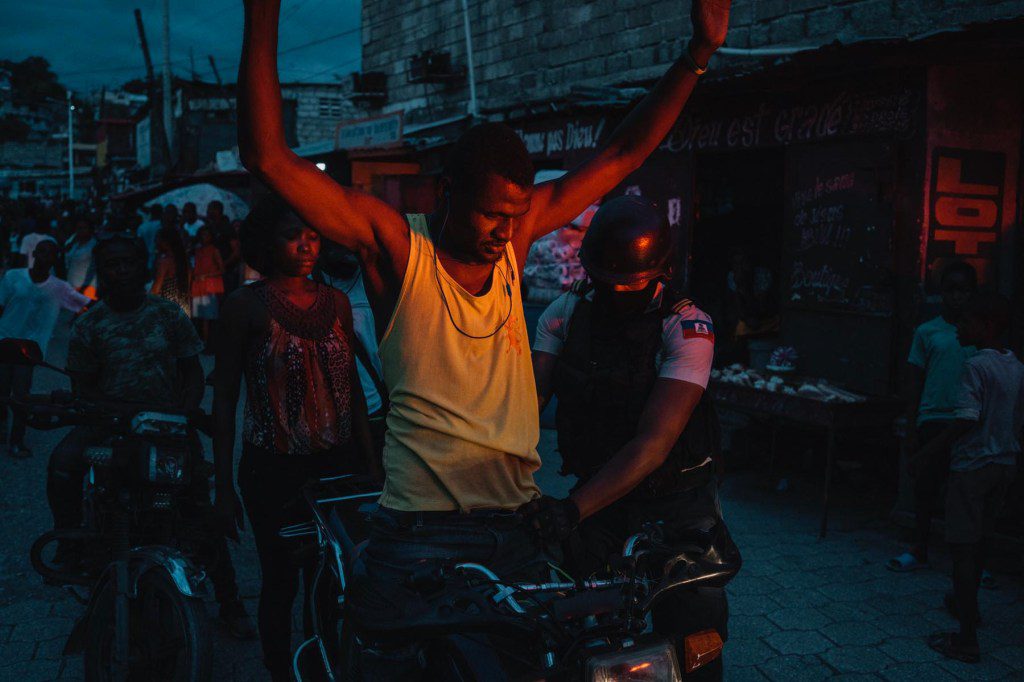
Police search Solino motorists for weapons after dark.
Jason Motlagh
The mob violence continued in May when another group of gang members was set upon and lynched by vigilantes, their bodies still smoldering on the sidewalk as school children walked by. “This is traumatic,” says Clifford Clerveaux, the owner of a furniture shop across the street. “I understand the frustration, but this can’t be the way to solve this. Things will go too far; innocent people could be killed.”
Around the corner, the pavement in front of the police station is blackened from another victim. “We try to contain the people — but only to a point because we don’t want them to turn on us,” the senior police officer on duty tells me. Earlier in the week a non-uniformed officer fired shots in the air to disperse a crowd of protesters, he says, only to have the crowd set him on fire. “When they realized he was police, it was already too late.”
Haiti has a blood-soaked history of casting off oppressors. The 1804 revolution that overthrew colonial France was the most successful slave revolt in history and spawned the first free Black republic in the world. When the 29-year dictatorship of former President Francois “Papa Doc” Duvalier and his son, Jean-Claude “Baby Doc” Duvalier, ended in 1986, the country was gripped by spasms of vigilantism aimed at erasing every vestige of their reign. In a campaign known as dechoukaj (uprooting), ex-members of the Tonton Macoutes, the notorious paramilitary force that tortured and killed thousands of Haitians, were hunted down and necklaced with flaming tires.
That spirit is resurgent. In Upper Delmas, I watched an activist hand out free machetes in a market as people chanted “Liberty or death.” In Debussy, vigilantes enforced their own checkpoints. And in Solino, I followed a mix of locals and off-duty police on a midnight patrol. They stayed awake throughout the night manning barricades of vehicles and furniture, illuminated with trash bonfires.
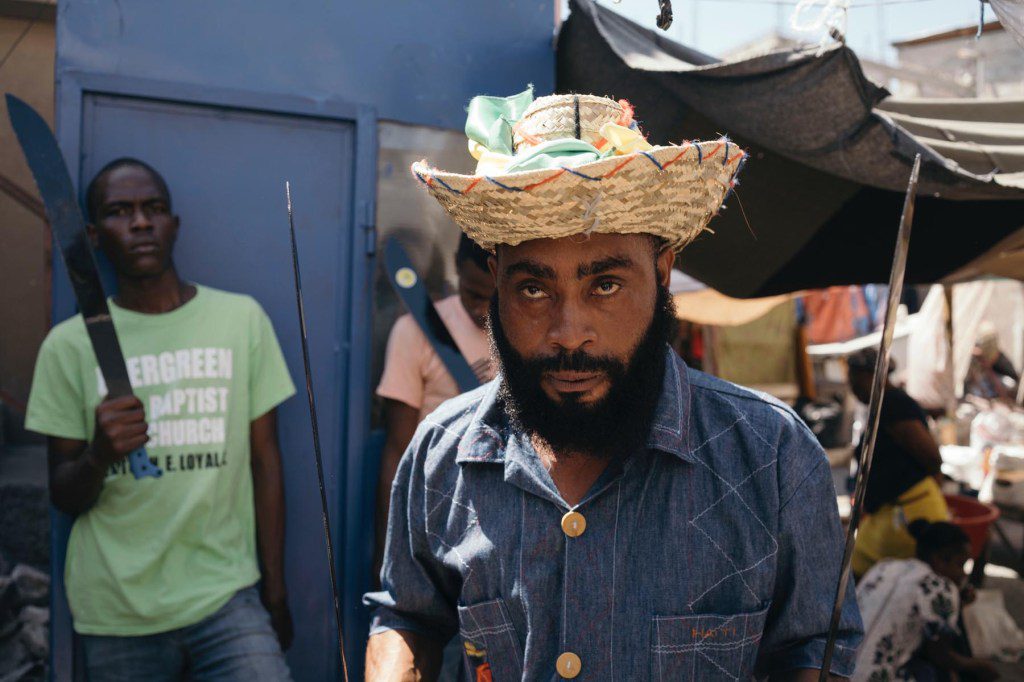
“L’Arabe” distributes machetes in a Delmas market as
part of the Bwa Kale anti-gang movement, Port-au-Prince.
“It’s true the [gangs] have big guns, but don’t forget 1804: Napoleon’s army had all the big guns, and what did the slaves have? Machetes and rocks,” says Patrick Destiné, 48, a local volunteer. “As long as we are breathing, we will defend our territory. And when we are done with the little bandits in the streets, next we are going after the bandits in suits — the ones with green eyes and businesses. They are criminals, too. They just display their violence in another way. The second revolution has begun here.”
VILLAGE DE DIEU (God’s Village), the home base of 5 Segond, is a seaside slum in the south of the capital. Getting there involves navigating a motorbike through rival fault lines and concrete barriers to the National Highway, where heavy rains and bad drainage have created gulfs of filthy water that serve as a kind of moat. The waterline is high enough to reach the exhaust pipe of the bike we’re on, causing it to sputter before we turn into a maze of alleys watched by stoned gunmen and locals with confused looks.
A final corner brings us to the inner sanctum of 5 Segond’s leader, Manno, and his trusted deputy Izo, the gang’s trash-talking mouthpiece and a wannabe rapper whose graphic videos have been banned from YouTube. Manno (né Emanuel Solomon) remains mysterious. Giant portraits of him and Izo adorn the wall, complemented with a billboard of Jim Carrey’s The Mask — Manno’s nickname from his early days as a stickup man. The chief, dark and bearded, pads up in faux-Gucci slippers smoking a blunt and apologizes that the pool is not filled; the water-delivery truck couldn’t get through. A Negev NG7 machine gun sits on a table — “a trophy,” says Manno. The two-year-old son of one of his dead soldiers wanders about.
Manno isn’t much of a talker, but in God’s Village his gruff words are the law. Starting as a soldier, he says, he rose up the ranks and became boss when his leader was arrested, getting shot three times along the way. 5 Segond (as in “five seconds and you’re dead”) made its name taking on police in gun battles, a fact that Manno is proud of. “This makes us superior to the other gangs,” he says. “A lot of people say G9 is strong, but I say it’s weak because it gets special support from the state.” Manno is wanted by the FBI for kidnapping an American citizen. He maintains his gang raises money by taxing trucks on the highway and collecting protection payments from small businesses. He’s evasive when pressed about kidnapping, saying only that the police’s inability to enter God’s Village makes it the ideal place to hide captives.
We take a walk through the Village accompanied by a squad of soldiers. A derelict police armored vehicle sits at the end of the block, a monument to a failed March 2021 raid that left five officers dead. Compared with Lower Delmas and G9 areas, the graffiti is less revolutionary, more West Coast gangsta; there are portraits of 2Pac and Ice Cube. We pause near the front line to avoid setting off a gunfight. I ask Manno how he keeps his fighters obedient, and he says that when Solomon asked God for help, he didn’t ask for money, he asked for wisdom. “You have to give them your vision; you’ll see they come to like what you like — almost like raising a child.”
Back at the base, a truck pulls up and Manno distributes packs of bootleg T-shirts, shorts, and sneakers to some of his crew. After dark, he presides over a lavish table spread in the middle of the street, joined by a pair of girlfriends who mix drinks for his soldiers, a man whose only apparent job is to roll blunts for the boss, and a pistol-packing 13-year-old consigliere who is always silent at Manno’s side.
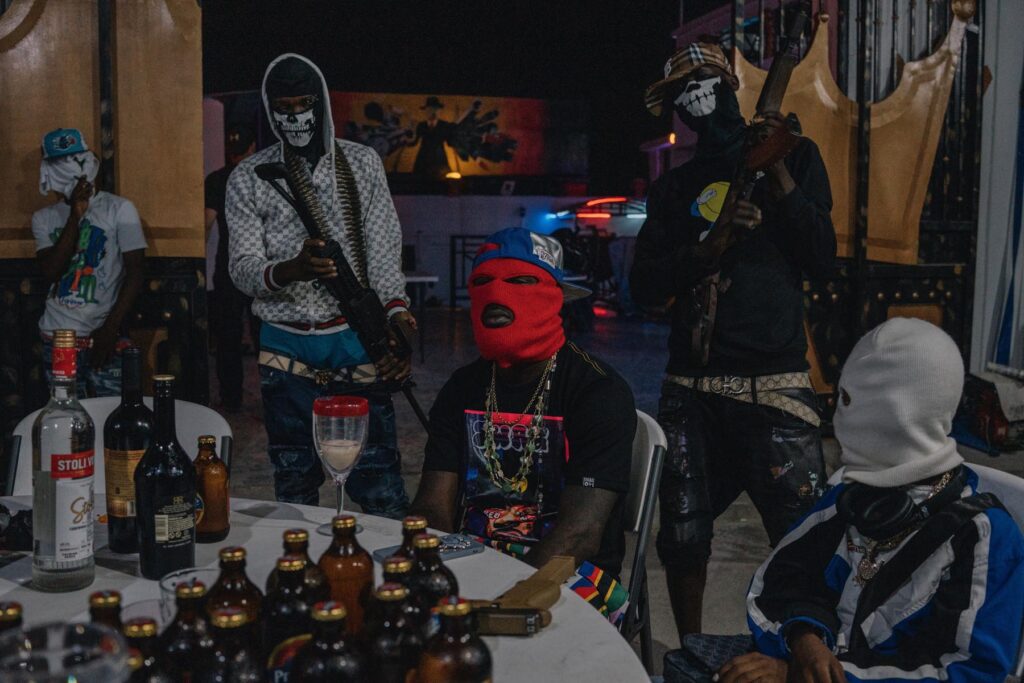
General Manno and 5 Segond soldiers “You have to give them your vision,” Manno says of the young gang members. “You’ll see they come to like what you like — almost like raising a child.”
Jason Motlagh
As music pulses, some of his Lost Boys begin to open up. Samuel, 32, says he gave up on an engineering degree, seeing no prospects. “It’s dog eat dog here,” he says. “Manno takes care of us, keeps us fresh,” gesturing to his new Air Jordans. “I’ll follow him and Izo to the end.”
A soldier named Black shares a story about a gang mission to assert G-Pep control over a large swath of western Port-au-Prince. Some 60 members of 5 Segond traveled to the area under cover of darkness and realized at dawn that they’d entered a trap. Police lying in wait hammered away from close range, dropping several men instantly. Black says he slipped away past dead comrades as bullets snapped around him. That same morning, the first Bwa Kale lynching had taken place in Canape Vert, and riled-up mobs were searching for gangsters in a frenzy. Over the next four days, Black says, he ran the urban-jungle gauntlet with six bullets in his gun, ready to kill himself before anyone put a tire on him. “Only 12 of us made it back. It’s a mystery that I’m still alive.”
Black came from a hardworking family, but dropped out of school and fell in with a bad crowd. While living on the streets, he says, he started smoking crack and running errands for gangsters. “You’re looking for a better life by joining a gang,” he says. “You’re sure to die. It’s like you sign a contract where the end of your life is also the end of the contract.”
Most nights he drinks himself to sleep and smokes weed upon waking to numb the guilt of the horrified faces of hostages, police he’s killed, the loss of his family and friends, his small world getting smaller. He says he believes in God, but that his life is in the hands of the devil. “I’ve done too much,” he says with a sigh. “I’m just waiting for the consequences of my actions.”
FOR HIS PART, Cherizier laughs when I ask if he’s worried about Bwa Kale. “There is no kidnapping or rape in the areas run by G9, so why should we worry?” he asks. “A group of people that I’m good to — who know they are nothing without me — will never kill me. They know that once I’m gone, there will be no more peace, no more support.”
On a sweltering June morning, Cherizier is sponsoring a “body wash” for the neighborhood — a street dance party where communal drums are filled with water and everyone gets soaked as a DJ works the decks. A shirtless Cherizier hands out beers and mangoes and throbs to the beat with his faithful, seemingly carefree in his fiefdom, notwithstanding the 9 mm Glock leashed to his hip. The party will go on all day, the water truck refilling the drums on demand.
Meanwhile, near a trash dump in the city center, Lourdy Denis and other displaced Bel-Air residents are packed into a shattered complex of concrete rooms waiting for handouts. The once-weekly arrival of the city water truck has families rushing to collect water that must last them the entire week.
Denis, his wife, his three surviving children, and blind mother sleep on the floor “breathing in each other’s breath.” More than 30 people somehow cram each night into a next-door room under a roof pocked with bullet holes. A stray shot thwacks against the outer wall of the compound and sends everyone scrambling. “This is happening all the time, and people are terrified,” says Mirlaine Saizmi, 44, a mom of three. Her aging mother rests on cardboard with a bullet lodged in her breast, waiting for an operation. At night, she says, rats bite her children and rain sloshes through the holes in the roof.
“We are living like animals,” says Steven Coicou, a street vendor whose wife was killed in a G9 attack. He pulled his four children from school after Denis’ boys died. With no work and severe inflation, he relies on funds from friends in the U.S. to feed them, “otherwise they would starve.” According to the U.N. World Food Program, a record 4.7 million Haitians face acute hunger. Like so many others, Coicou wants to leave the country with his family but lacks the means. “How is it possible that we are neighbors of America?” he asks. “Its leaders must take us for nothing.”
The United States has largely stood idle as Haiti’s crisis deepens. “Haiti is not a strategic country for the U.S.,” says Fatton, “only insofar as it’s next door with the problem of migration.” He thinks the Biden administration will stay on the sidelines given wars in Ukraine and the Middle East and the failure of previous interventions to resolve the country’s woes.
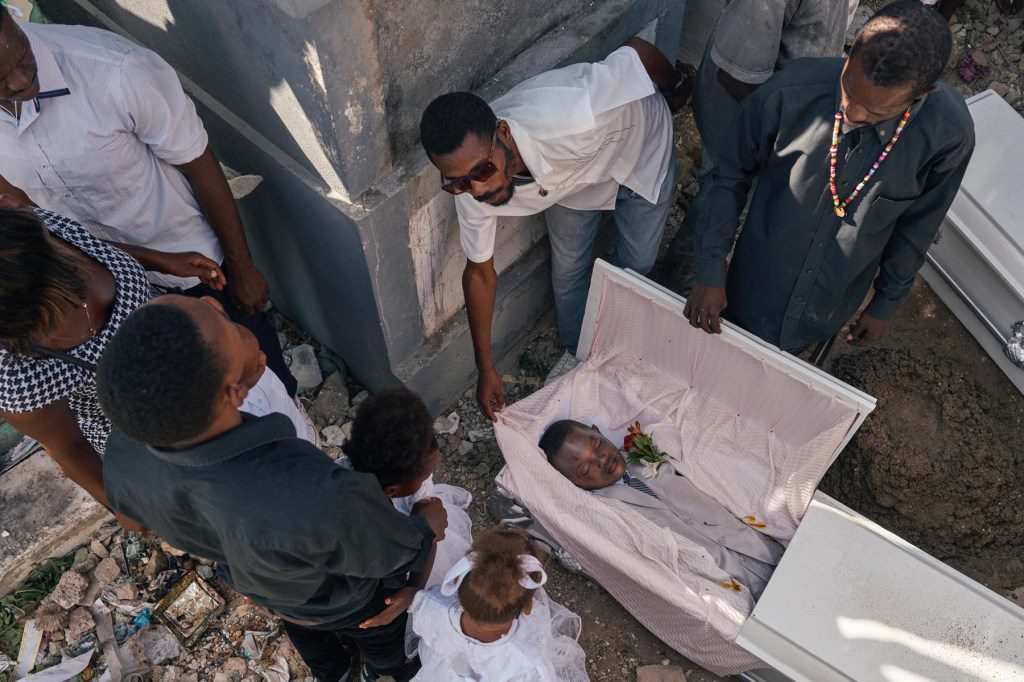
The funeral of Denis’ children. “Barbecue is destroying everything,” Denis says. “He is a vampire, who feeds on blood.”
Jason Motlagh
The alternatives don’t inspire confidence. Kenya, backed by a pledge of up to $200 million in support from the U.S., is prepared to send 1,100 police officers to lead a U.N.-approved security force to take on the gangs. But Kenyan police have an abysmal human rights record. Sexual violence and deadly cholera outbreaks wrought by foreign forces in the past have made Haitians averse to intervention; even at this desperate hour, when nearly 70 percent of people in one survey supported the deployment of a multinational force, there’s a lot of cynicism about what outsiders can achieve. Restoring the rule of law will require longer-term investments in overhauling the police and demobilizing gang members, justice and prison reform, and border and customs controls, says Muggah, and “the donor appetite for this kind of support is not abundantly clear.” “All we have seen the international community or the U.N. ever do is come with a Band-Aid solution,” says Charlier. “And what we’re seeing today, a Band-Aid is not enough.”
One last-ditch option that still has currency among some Haitian elites is hiring foreign mercenaries, unencumbered by human rights concerns, to try to exterminate the gangs. (It took just one hit squad to murder the president in his bedroom.) Leaked U.S. documents revealed that Russia’s Wagner Group were seeking government contracts. But this is a scenario that would only drown the nation in more blood.
Regardless, Cherizier insists he’s ready for any fight and has even bigger ambitions. “In acknowledgment of my struggling for my community and my country, I might be required to get into politics in the future.”
For the foreseeable future, the same cast of criminal elites will continue to profit from the impunity that has made life untenable for most Haitians — driving anyone who can to leave the country, and those who can’t deeper into despair. “The population is just going to feel more anger. And at some point, the gangs are going to react and there’s going to be a huge massacre,” says Charlier. “I believe this will end in blood and ashes.”
THREE WEEKS AFTER his sons were gunned down, Lourdy Denis was able to raise the funds needed to give them a funeral. During a brief Saturday morning service at St. Antoine church in Poste-Marchand, he sat next to their caskets in a new suit, gaunt and pale but holding himself together as other mourners broke down in tears. A long, slow procession through the downtown ends with a bottleneck at the entrance to the municipal cemetery, as two other groups bore their dead relatives: one killed by gang fire, the other lost to disease.
Lourdy stops and lingers outside of the cemetery; in Haiti, it’s considered bad luck for parents to attend their children’s funeral, lest they bring a curse to other offspring. I follow the pallbearers through crumbling passages plied by goats and grave robbers. People jostle over bone and shredded clothing to position the caskets into a pair of slots cleared of previous remains. No one says a word in remembrance. Even this far from Bel-Air, Cherizier occupies their minds.
“I didn’t want to enter the cemetery since my wife was buried here two months ago,” says Coicou. “But if nobody speaks up, things will only get worse. We’re lucky to find the boys’ bodies, but do you know how many others have disappeared? We have to stand up and say, ‘Enough is enough.’ ”
The last I see Denis, he’s seated in the doorway of his cell-like room, smoking in a daze. “I cannot stop thinking about my sons,” he says. “They are always with me.” Two of his remaining children amble around — too young to understand what had happened to their siblings. Denis looks at me. “You can adopt them if you like, and take them away from this place. There is no life here, no future,” he says. “For me, they’re already as good as dead.”
